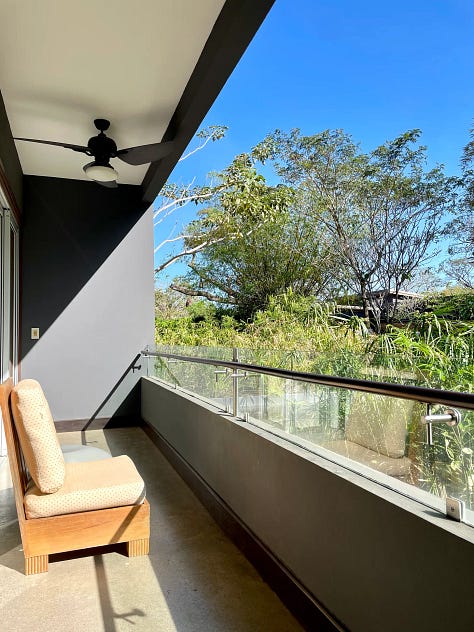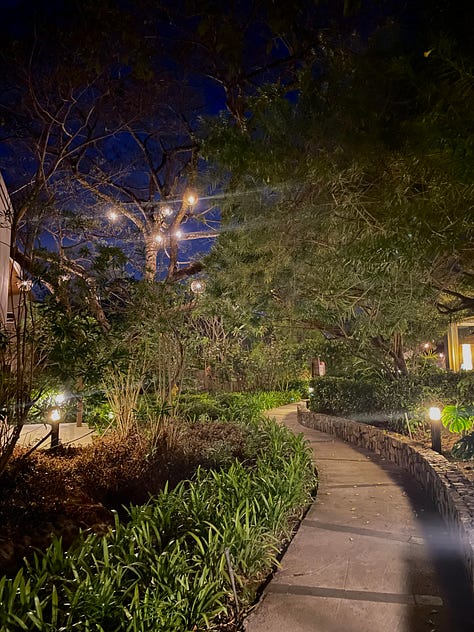Untying the knots from childhood
A few notes about honouring our childhood experience for healthy progression and growth as adults.
At the end of every week, I’m going to bring you a list of things I’m noticing. Something creative, reflective, or practical which may include some things I’m thinking about, my favourite pieces of art, and any books or articles I’m reading.
Something I’m thinking about this week is inner child work, a psychological and somatic practice that has been popularized through quote cards and content creators on social media.
Inner child work typically involves a deep exploration of our At its core, inner child healing is a way of honouring our childhood experience by acknowledging the parts of us that felt the way they did, thought the things they thought, and behaved how we behaved. You can see by this framing how useful this practice might be. It is a non-judgmental and compassionate reflection of how we grew up and what that experience was like for us.
For people who have faced early extreme adversities or beyond difficult bonding relationships with their caregivers, inner child healing can be both therapeutic, uncomfortable, and even distressing.
Something I’m thinking about is the fact that many things are usually true. Our experience of childhood was hard and we didn’t know it at the time. Our parents parents wanted to be a caring parent and they didn’t know how or they thought they were doing enough. Our parents became parents and that may have not been something they were prepared for. Our feelings were our feelings and we’re grown up now, affected by our experience.
If your experience of childhood was complicated, confusing, or scary, honour the parts of you that felt that way. The goal is not just to think differently about your situation— it is about honouring how your childhood felt (or may have felt) at the time in order to honour the feelings that are (or may be) there.
This is a process I help clients of all ages explore every day. If you’re just getting started, I can understand why this may seem abstract or confusing. Let’s access this concept through something you’ve likely done before: untying a knot.
If you’ve ever untied a knot before, which many of us have, you know that if you do it too fast or pull too hard, you can unintentionally make your goal a lot harder to accomplish. To untie a knot, it is best to go slow. Honouring, processing, and making sense of our childhood self is similar. We do it slowly and intentionally. Untying the knots of our past is inherently a slow process, not because it can’t be done quickly, but because it is lifelong process. Untying our knots is no sprint.
Maybe this concept of untying things slowly isn’t new to you. This is a story we’ve seen before: slow and steady wins the race, slow down to speed up, and always aim for a smooth landing. These highlight a central theme of goal setting and achievement; a faster pace does not ensure a quicker outcome. We must go slow.
When it comes to untying the knots from childhood, it is best to go slow by sitting with the parts of you that felt what you felt. This includes joy and excitement, by the way! If calling up certain memories or thinking about certain things is distressing or overwhelming, it is best to do this work relationally with a health care provider.
Sometimes it might feel best to leave the knot all tied up. Even though that’s what might feel most comfortable, that may not always be what we need to live a richer and more meaningful life. Life, in this case, is a constant unraveling and untying of the knots that hold us back or keep us stuck. The truth is, the goal in untying our knots isn’t to live a knot-free existence. The goal isn’t to untie everything. Living life untied has its vulnerabilities too. We need both. Life is full knots. And there’s a quiet magic in being able to untie the ones that no longer have a purpose.
Remember, the inner child is a part of you but it is not the whole of you. You are allowed to revisit certain moments and acknowledge what felt true at that time. This means the goal is not to move on, it is to onboard this part of your experience into the story of how you came to be who you are.
I want to conclude with a few short things that came up for me while doing this work:
Honouring our childhood experience is not about bringing up bad things that happen so we can live from that place, it is so we can live through them. This is how we move from fragmentation to integration.
Honouring our childhood experience is not just a thought exercise. It is a process and practice of honouring the parts of us that felt the way they did.
Honouring our childhood experience is not about blaming others. It is about acknowledging our own experience rather than assigning a culprit.
Honouring our childhood experience is not about arriving at a healed and unaffected state of being. There is no arrival because there is no endpoint. In life, we constantly bump up against our former selves and we remain affected and driven by it when we don’t know the root or have no way of organizing that experience for ourselves.
Some things I’m noticing this week:



I’m taking time for myself alongside time for work. I’m travelling for work, speaking at the Thrive Summit in Costa Rica. I took a few days on each end of the retreat just for me, which is something I’m doing more of lately. I’m noticing the sun, the gorgeous greenery, and new relationships.
I read this article in The Atlantic (you’ll soon see how much I love The Atlantic) by Megan Garber called We’ve Lost The Plot about how we’re already living in the metaverse and how our constant need for entertainment has changed how we understand ourselves and relate with each other. I found the article through an attention-grabbing episode the podcast of Offline by Jon Favreau called Are We Amusing Ourselves to Death?
I read this article in The Atlantic by Derek Thompson: America’s Teenage Girls Are Not Okay, which is a reflection on the teen mental health crisis.
I’m listening to the song Rewind by Attic Beats on repeat as I write and relax. The perfect mix for motivation and relaxation, which is a flow sweet-spot for me.
I’m anticipating the launch of Mara Glatzel’s book, Needy. I was recently on her podcast discussing our need for safety and connection. You can listen to the episode here and preorder her book here.
Speaking of needs, I’m also celebrating the release of our long overdue two-part deep dive on meeting our needs via my podcast, This Isn’t Therapy. Check out the episode called “What are my needs?” below.
That’s all for now,
Jake






That was lovely and helpful and realistic. Thanks!